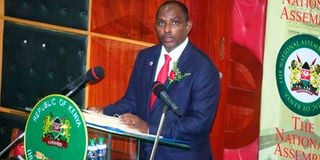Premium
Pay all pending bills or miss cash, Ukur Yatani tells counties

Treasury and National Planning Cabinet Secretary Ukur Yatani presents the Sh3.6 trillion 2021/2022 budget in the National Assembly on June 10, 2021.
National Treasury Cabinet Secretary Ukur Yatani is seeking Parliament’s approval to temporarily stop funds to county governments that have consistently failed to pay their suppliers.
Mr Yatani, during his 2021/2022 budget statement, he said that delays in payment of government bills to suppliers has led to liquidity problems at a time when most companies are suffering from the effects of the Covid-19 pandemic.
The CS has ordered all government ministries, departments and agencies (MDAs) to clear their pending bills that run into billions of shillings before the close of the current financial year on June 30.
“Though progress was made in settlement of these bills by the national government, we still have challenges with the county governments that still owe various suppliers huge amounts. In this regard, I direct government ministries, departments and agencies and the county governments to clear all their pending bills by June 30, 2021,” the CS ordered.
“Mr. Speaker, I urge this House to support our efforts towards enforcing compliance in payment of all verified pending bills by county governments by backing our proposal under Article 225 of the Constitution of Kenya to temporarily stop transfers to county governments that persistently fail to comply with the directive to clear pending bills,” he said.
Budgetary allocations
Mr Yatani, speaking to the press after presenting his budget speech, said that Treasury has ordered an audit to establish the amount of pending bills in each county, and for each county to give a clear report on how they are planning to clear them with their budgetary allocations.
“We have commissioned a new audit exercise for the counties so that these bills are verified and then the counties will give us a roadmap on how they are going to settle them. You cannot continue disbursing funds when the suppliers of those goods and services are not paid,” Mr Yatani said.
Data from the Treasury shows that the total pending bills as at September last year stood at Sh346.2 billion, having risen from Sh334.2 billion in June.
Among the MDAs, the State Department of Infrastructure has the highest pending bills at Sh99 billion, nearly half of its Sh192.54 billion budgetary allocation for the new fiscal year. Of this, payment of Sh31 billion is due for compensation to landowners who were relocated to pave way for construction of projects.
Infrastructure projects
A similar bond is already being used by the Treasury to source funds to finance infrastructure projects, and Central Bank of Kenya in April issued a Sh60 billion 18-year amortised bond to finance these projects in the just-ended financial year and opened bids for a minimum of Sh100, 000 from each investor.
The investors in the tax-free bond will get interest payments in six-month intervals with the first payment due on October 11.
“Pending bills and stalled projects continue to present a significant challenge in almost all sectors of the budget. No clear road map has been provided by the National Treasury on how to effectively conclude these matters,” the committee said.
“Having considered the above matters, the Committee recommends that the National Treasury sets up a fund that may be financed through a long-term bond for the payment of the existing verified pending bills and court awards,” it added.





